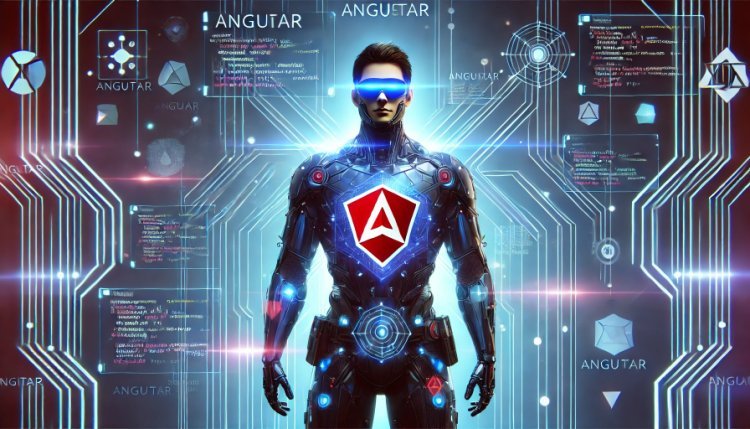Top Free Resources to Master Angular from Scratch: A Comprehensive Guide for Beginners

Top Free Resources to Master Angular from Scratch
Are you eager to dive into the world of modern web development? Looking to master Angular from scratch but don't know where to begin? Before diving deep into the technical aspects, you might want to check out this comprehensive Angular course to get started, or prepare yourself with these essential angular interview questions for your future career opportunities.
In this comprehensive guide, we'll explore the best free resources to master Angular from scratch, helping you navigate through the vast ocean of learning materials available online. Whether you're a complete beginner or looking to polish your skills, these carefully curated resources will set you on the path to becoming an Angular expert.
Essential Online Platforms to Master Angular from Scratch
The Official Angular Documentation
The Angular team has invested significant effort in creating comprehensive documentation that serves as both a learning resource and a reference guide. The official docs feature:
- Interactive examples
- Step-by-step tutorials
- Best practices and guidelines
- API documentation
- Community contributions
Free Video Tutorials and Courses
Several platforms offer high-quality video content for learning Angular:
- YouTube channels dedicated to Angular development
- Coursera's free Angular-related courses
- Udacity's web development fundamentals
- FreeCodeCamp's Angular curriculum
Community-Driven Learning Resources
Developer Forums and Discussion Boards
Active communities where developers share knowledge and solve problems:
- Stack Overflow's Angular community
- Reddit's r/Angular
- Angular Discord channels
- GitHub discussions
Open-Source Projects and Examples
Learning through real-world applications:
- GitHub repositories with Angular examples
- Code sandboxes
- Community-maintained starter projects
- Sample applications with various complexity levels
Interactive Learning Platforms
Coding Challenges and Exercises
Platforms offering hands-on practice:
- Codecademy's Angular tracks
- HackerRank's web development challenges
- Exercism's TypeScript exercises
- Angular-specific coding challenges
Online IDEs and Development Environments
Tools for practicing Angular development:
- StackBlitz
- CodeSandbox
- GitPod
- Angular playground
Supplementary Learning Materials
Blogs and Articles
Many developers maintain blogs sharing their Angular expertise and experiences. These resources often provide unique insights and practical tips that complement official documentation.
Video Podcasts and Webinars
Regular shows and recordings covering:
- Angular updates and news
- Best practices
- Performance optimization
- Real-world case studies
Advanced Learning Pathways
For those looking to deepen their understanding, several free resources focus on advanced Angular concepts:
- State management
- Performance optimization
- Testing strategies
- Security best practices
Building Your First Angular Application
When starting your journey to master Angular from scratch, it's essential to begin with small, manageable projects. Consider these project ideas:
- Todo application
- Weather dashboard
- Recipe book
- Personal portfolio
- Simple e-commerce interface
Implementation Guidelines
Focus on implementing core Angular concepts:
- Components and modules
- Services and dependency injection
- Routing and navigation
- Forms and validation
- HTTP client integration
Best Practices and Common Pitfalls
Understanding best practices early in your learning journey can save you from common mistakes:
- Proper component architecture
- Efficient change detection
- Optimal dependency management
- Performance considerations
- Security implementations
Learning Path Recommendations
Based on your experience level:
Beginners:
- Start with fundamentals
- Focus on component basics
- Learn TypeScript essentials
Intermediate:
- Explore advanced patterns
- Study state management
- Practice testing
Advanced:
- Contribute to open source
- Build complex applications
- Mentor others
As you conclude your journey to master Angular from scratch, remember that continuous learning and practice are key to success. The resources mentioned above provide a solid foundation for building modern web applications with Angular.
Framework-Specific Development Tools
Code Generation Tools
Angular CLI provides powerful code generation capabilities:
-
Component generation
-
Service scaffolding
-
Module creation
-
Routing setup assistance
Debugging Extensions
Essential tools for efficient debugging:
-
Angular DevTools
-
Augury
-
VS Code Angular extensions
-
Chrome Developer Tools Angular debugging
Performance Optimization Techniques
Lazy Loading Implementation
Optimize application load times through:
-
Feature module separation
-
Route-based lazy loading
-
Preloading strategies
-
Dynamic imports
Bundle Size Management
Techniques for reducing application size:
-
Tree shaking
-
Code splitting
-
Differential loading
-
Build optimization flags
Security Best Practices
Authentication Patterns
Implementing secure user authentication:
-
JWT implementation
-
OAuth integration
-
Session management
-
Security best practices
Data Protection
Securing sensitive information:
-
XSS prevention
-
CSRF protection
-
Input sanitization
-
Secure HTTP headers
Testing Strategies
Unit Testing Frameworks
Popular testing tools and frameworks:
-
Jasmine
-
Karma
-
Jest configurations
-
Test coverage tools
End-to-End Testing
Comprehensive testing approaches:
-
Protractor setup
-
Cypress integration
-
TestBed configuration
-
Mock service workers
State Management Solutions
NgRx Implementation
Understanding state management:
-
Store setup
-
Actions and reducers
-
Effects handling
-
Selectors optimization
Alternative State Solutions
Other state management options:
-
NGXS
-
Akita
-
Custom services
-
Observable stores
Deployment and CI/CD
Build Configurations
Setting up production builds:
-
Environment configuration
-
Build optimization
-
Asset management
-
Cache busting strategies
Continuous Integration
Implementing CI/CD pipelines:
-
GitHub Actions
-
Jenkins setup
-
Azure DevOps
-
CircleCI configuration
Architectural Patterns
Component Design Patterns
Advanced component architectures:
-
Smart vs. Presentational components
-
Component communication
-
Change detection strategies
-
Lifecycle optimization
Service Layer Architecture
Organizing service structure:
-
Service hierarchies
-
Dependency injection
-
Provider configurations
-
Service workers
Real-Time Features
WebSocket Integration
Implementing real-time functionality:
-
Socket.io setup
-
SignalR integration
-
WebSocket services
-
Real-time updates
Server-Sent Events
Handling server push notifications:
-
EventSource implementation
-
SSE services
-
Push notifications
-
Real-time data streams
Internationalization
Multi-Language Support
Implementing language features:
-
i18n setup
-
Translation management
-
Language switching
-
RTL support
Localization Strategies
Managing local-specific content:
-
Number formatting
-
Date handling
-
Currency display
-
Cultural considerations
Accessibility Implementation
ARIA Integration
Making applications accessible:
-
ARIA attributes
-
Keyboard navigation
-
Screen reader support
-
Focus management
Accessibility Testing
Ensuring accessible applications:
-
Automated testing tools
-
Manual testing procedures
-
Compliance checking
-
User testing methods
Mobile Development
Progressive Web Apps
Creating mobile-friendly applications:
-
Service worker implementation
-
Offline functionality
-
Push notifications
-
App manifest setup
Mobile-First Design
Implementing responsive design:
-
Flexible layouts
-
Touch interactions
-
Device-specific features
-
Performance optimization
Documentation Practices
Code Documentation
Maintaining clear documentation:
-
JSDoc implementation
-
README management
-
API documentation
-
Style guides
Project Documentation
Creating comprehensive guides:
-
Architecture documentation
-
Setup instructions
-
Deployment guides
-
Contribution guidelines
Version Control Best Practices
Git Workflow
Managing source code:
-
Branch strategies
-
Commit conventions
-
Pull request workflows
-
Code review processes
Release Management
Handling version releases:
-
Semantic versioning
-
Changelog maintenance
-
Release notes
-
Version tagging
Error Handling and Logging
Global Error Management
Implementing error handling:
-
Error interceptors
-
Custom error pages
-
Error tracking
-
User feedback
Logging Systems
Setting up application logging:
-
Log levels
-
Log aggregation
-
Monitoring setup
-
Debug information
As we conclude this comprehensive guide to master Angular from scratch, remember that these resources and topics represent just the beginning of your journey. The Angular ecosystem is constantly evolving, and staying updated with these resources will help you maintain your expertise in this powerful framework.
The path to mastering Angular requires dedication, practice, and continuous learning. By leveraging these free resources and following structured learning paths, you'll be well-equipped to build robust, scalable applications that meet modern web development standards.
FAQs
What programming languages should I know before starting web development?
HTML, CSS, and JavaScript are essential prerequisites. TypeScript knowledge is also beneficial as it's the primary language used in development.
How long does it typically take to become proficient in web frameworks?
With dedicated study and practice, most developers achieve basic proficiency within 3-6 months. However, mastery requires continuous learning and real-world project experience.
Should I learn JavaScript frameworks before TypeScript?
While it's not mandatory, having a solid understanding of JavaScript can make learning TypeScript and frameworks easier.
Can I build professional applications using free resources?
Yes, many developers have built successful applications using free resources. The key is practice and applying what you learn effectively.
Is web development still a viable career choice?
Absolutely! The demand for skilled web developers continues to grow, with numerous opportunities across industries.
How important is responsive design in modern web development?
Responsive design is crucial as users access websites from various devices. It's a fundamental skill for any web developer.
What role does testing play in development?
Testing ensures code quality, prevents bugs, and makes maintenance easier. It's an essential part of the development process.
Are there specific tools required for framework development?
While not required, tools like VS Code, Chrome DevTools, and Git can significantly improve your development workflow.
How often should I practice coding while learning?
Regular practice is essential. Aim for at least a few hours daily, working on personal projects or coding exercises.
What's the best way to stay updated with new features?
Follow official documentation, join community forums, attend webinars, and participate in online discussions to stay current with updates and best practices.
What's Your Reaction?













